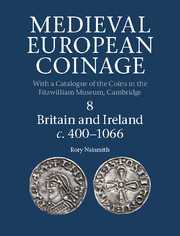Book contents
- Frontmatter
- Contents
- List of plates
- List of figures
- List of maps
- List of tables
- Preface
- Note on spelling
- List of abbreviations
- 1 Introduction
- 2 From Roman Britain To Anglo-Saxon England
- 3 Early Anglo-Saxon Gold Coinage
- 4 The Early Silver Pennies
- 5 The Kingdom Of Northumbria
- 6 The ‘Mercian Supremacy’ In The Age Of Offa And Coenwulf
- 7 The Rise Of Wessex In Southern England
- 8 The Reign Of Alfred The Great
- 9 England From Edward The Elder To Edgar's Reform
- 10 The Late Anglo-Saxon Coinage
- 11 The Anglo-Viking Coinages
- 12 Wales And Scotland
- 13 The Isle Of Man And ‘Irish Sea’ Coinages
- 14 Ireland To 1170 (with Andrew Woods)
- APPENDICES
- Bibliography
- CATALOGUE
- Concordances
- Indexes
7 - The Rise Of Wessex In Southern England
Published online by Cambridge University Press: 11 May 2017
- Frontmatter
- Contents
- List of plates
- List of figures
- List of maps
- List of tables
- Preface
- Note on spelling
- List of abbreviations
- 1 Introduction
- 2 From Roman Britain To Anglo-Saxon England
- 3 Early Anglo-Saxon Gold Coinage
- 4 The Early Silver Pennies
- 5 The Kingdom Of Northumbria
- 6 The ‘Mercian Supremacy’ In The Age Of Offa And Coenwulf
- 7 The Rise Of Wessex In Southern England
- 8 The Reign Of Alfred The Great
- 9 England From Edward The Elder To Edgar's Reform
- 10 The Late Anglo-Saxon Coinage
- 11 The Anglo-Viking Coinages
- 12 Wales And Scotland
- 13 The Isle Of Man And ‘Irish Sea’ Coinages
- 14 Ireland To 1170 (with Andrew Woods)
- APPENDICES
- Bibliography
- CATALOGUE
- Concordances
- Indexes
Summary
HISTORICAL INTRODUCTION
The half-century between the battle of Ellendun /Wroughton in 825 and the chaos brought about by the Viking ‘Great Army’ in the 860s and 870s saw the last flowering of separate Anglo-Saxon kingdoms (Wormald 1982b). The kingdoms of Wessex, Mercia, Northumbria and East Anglia each still possessed their own dynasty; smaller kingdoms remained important as internal components of these larger polities, but no longer had the capacity for independent political action (for the case of Essex at this time, see Yorke 1985, 24, 36).
The status quo between the four main kingdoms was relatively stable during this period following a brief but tumultuous phase of warfare between Wessex and Mercia in the 820s. It was these military successes that established Wessex as a serious challenger to Mercian hegemony in southern England (Keynes 1995, 39–41). Ecgberht's victory in 825 brought the south-east of England (Essex, Surrey, Sussex and Kent) under West Saxon control, and these territories were to remain important components of the West Saxon kingdom, more integrated into the workings of royal government than they had been under Mercian overlordship (Keynes 1993). Another campaign against Mercia in 829 made Ecgberht king of the Mercians (as well as the West Saxons) for a year, and he traversed the kingdom to meet with the ruler of the Northumbrians at Dore, South Yorkshire, as well. This action later prompted the Anglo-Saxon Chronicle to acclaim Ecgberht as the eighth in a line of kings with dominion over all England south of the Humber, temporary though his supremacy was: Wiglaf, former king of the Mercians, regained the throne the following year (827–9, 830–40). After 830 there is no further evidence of direct conflict between the English kingdoms. That said, there are significant gaps in the record concerning Mercia and Wessex, while precious little information survives about Northumbria in the fifty or so years before its conquest by Vikings in 867 (see Chapter 5, section (g), pp. 119–25) and virtually nothing about East Anglia during the same period. This last kingdom had thrown off Mercian suzerainty in 825 and accepted Ecgberht as overlord of the East Angles, though its subsequent status is murky: two kings of the Mercians in succession – Beornwulf (in 825 or 826) and Ludica (in 827) – died fighting the East Angles.
- Type
- Chapter
- Information
- Medieval European Coinage , pp. 146 - 164Publisher: Cambridge University PressPrint publication year: 2017

